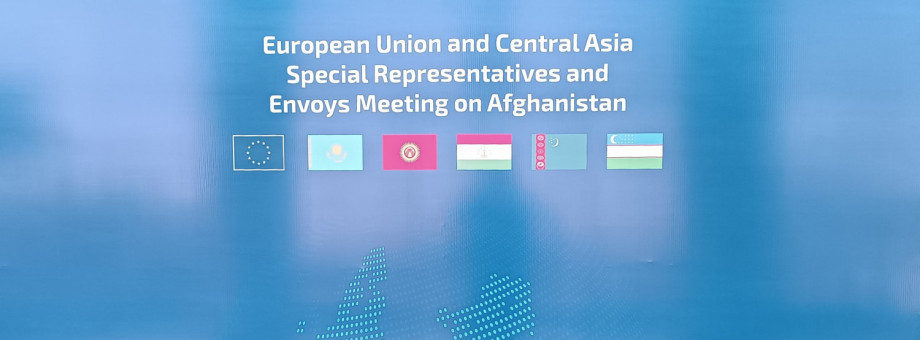JOINT STATEMENT FOLLOWING THE 4TH MEETING OF SPECIAL REPRESENTATIVES AND ENVOYS FOR AFGHANISTAN IN THE "CA-EU" FORMAT IN ASHGABAT

Joint Statement
by Special Representatives and Special Envoys for Afghanistan of the European Union, Republic of Kazakhstan, Kyrgyz Republic, Republic of Tajikistan, Turkmenistan and Republic of Uzbekistan and the EU Special Representative for Central Asia following the meeting on 26 May 2023 in Ashgabat
The fourth meeting in the EU and Central Asia Special Representatives and Special Envoys for Afghanistan and the EU Special Representative for Central Asia format was held on 25-26 May in Ashgabat. It provided an opportunity for an in-depth exchange on developments and economic situation in Afghanistan, and allowed to discuss continued cooperation in assisting the people of Afghanistan and intensification of cooperation in areas of common interest. During the meeting they also had an exchange with UN Secretary General's Special Representative for Afghanistan, Head of UNAMA Roza Otunbayeva and via video link with the World Bank Country Director for Afghanistan, Melinda Good, as well as World Bank Country Director for Kazakhstan, Andrei Mikhnev.
The Special Representatives and Envoys
- Reaffirmed their strong commitment to the people of Afghanistan and to seeing Afghanistan develop into a stable, peaceful and prosperous country with long-term prospects for lasting peace.
- Recalled and reconfirmed principles and expectations expressed in previous statements following discussions in this format in Tashkent, Almaty and Brussels, including regarding the human rights and security situation.
- Underlined the importance of the establishment of an inclusive and representative government and of upholding civil, political, social economic and cultural rights of all Afghans.
- Recalled the concerns expressed in UN Security Council Resolution 2681 (2023) at the increasing erosion of human rights and fundamental freedoms and the dire economic and humanitarian situation and recognised the efforts of the international community to continue assisting the people of Afghanistan in a principled manner and in accordance with international law and universally recognized norms and principles, despite difficult circumstances.
- Urged the Taliban to lift all bans on Afghan girls and women restricting their rights to education, work and participation in public life. These bans – beyond being serious human rights violations – are having detrimental effects on the ability of the international community to deliver humanitarian aid to the Afghan people, and need to be lifted for the Afghan economy to prosper, and ultimately for Afghanistan to achieve long-term stability and peace.
- Discussed prospects and challenges for economic stabilization and recovery of Afghanistan, noting the importance of favourable conditions for economic activity, the financial and banking sector and the restoration of social-economic infrastructure in Afghanistan being created, which would allow for further assistance by the international community.
- The participants called on the Taliban to prevent the Afghan territory from being used as a safe haven for hosting, planning, training, financing or exporting terrorism and violent extremism to other countries.
- Negative spill-over effects from Afghanistan, such as terrorism, violent extremism, drug trafficking and other illicit crossborder activities, will negatively impact the region. Also, the use of shared natural resources has to take the needs of all neighbours into account. Participants welcomed the efforts by the regional countries and organisations, as well as international partners, to prevent and address such developments.
- Given the shared goal of wanting to see peace and stability in Afghanistan and the region, the participants highlighted the need for continued dialogue and cooperation among the participants of this format and the wider international community.
The participants agreed to continue meeting in this regional format on a regular basis at alternating venues as a platform for consultation, coordination and cooperation, and supported the proposal to hold the next meeting in the autumn.


 NEWS
NEWS